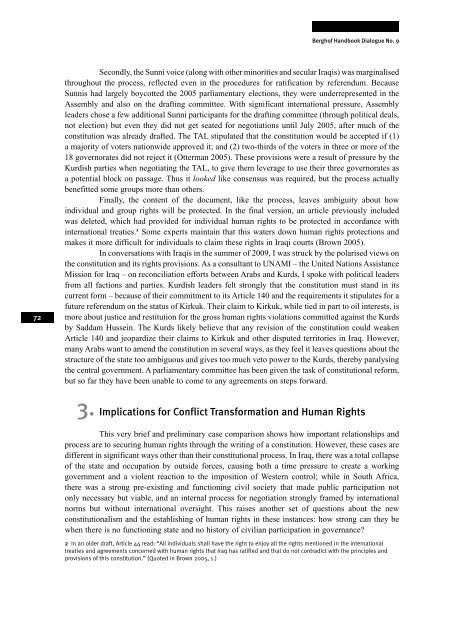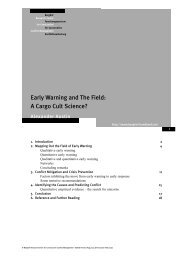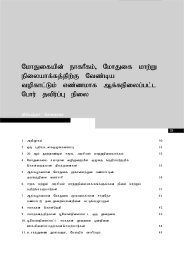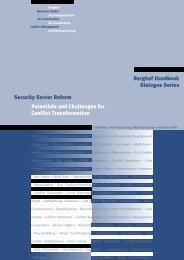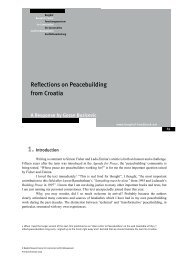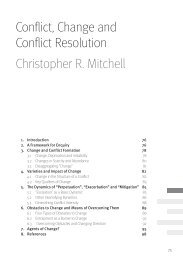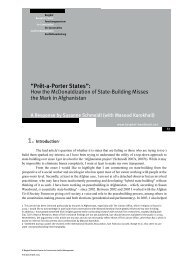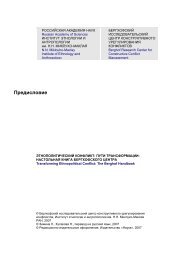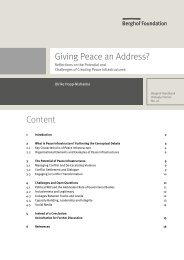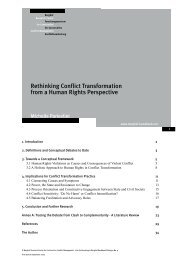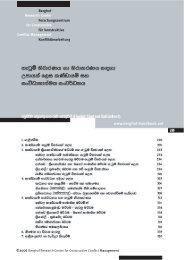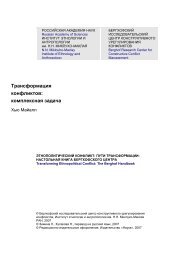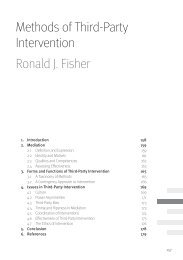Human rights and conflict transformation: The challenges of just peace
Human rights and conflict transformation: The challenges of just peace
Human rights and conflict transformation: The challenges of just peace
You also want an ePaper? Increase the reach of your titles
YUMPU automatically turns print PDFs into web optimized ePapers that Google loves.
72<br />
Bergh<strong>of</strong> H<strong>and</strong>book Dialogue No. 9<br />
Secondly, the Sunni voice (along with other minorities <strong>and</strong> secular Iraqis) was marginalised<br />
throughout the process, reflected even in the procedures for ratification by referendum. Because<br />
Sunnis had largely boycotted the 2005 parliamentary elections, they were underrepresented in the<br />
Assembly <strong>and</strong> also on the drafting committee. With significant international pressure, Assembly<br />
leaders chose a few additional Sunni participants for the drafting committee (through political deals,<br />
not election) but even they did not get seated for negotiations until July 2005, after much <strong>of</strong> the<br />
constitution was already drafted. <strong>The</strong> TAL stipulated that the constitution would be accepted if (1)<br />
a majority <strong>of</strong> voters nationwide approved it; <strong>and</strong> (2) two-thirds <strong>of</strong> the voters in three or more <strong>of</strong> the<br />
18 governorates did not reject it (Otterman 2005). <strong>The</strong>se provisions were a result <strong>of</strong> pressure by the<br />
Kurdish parties when negotiating the TAL, to give them leverage to use their three governorates as<br />
a potential block on passage. Thus it looked like consensus was required, but the process actually<br />
benefitted some groups more than others.<br />
Finally, the content <strong>of</strong> the document, like the process, leaves ambiguity about how<br />
individual <strong>and</strong> group <strong>rights</strong> will be protected. In the final version, an article previously included<br />
was deleted, which had provided for individual human <strong>rights</strong> to be protected in accordance with<br />
international treaties. 2 Some experts maintain that this waters down human <strong>rights</strong> protections <strong>and</strong><br />
makes it more difficult for individuals to claim these <strong>rights</strong> in Iraqi courts (Brown 2005).<br />
In conversations with Iraqis in the summer <strong>of</strong> 2009, I was struck by the polarised views on<br />
the constitution <strong>and</strong> its <strong>rights</strong> provisions. As a consultant to UNAMI – the United Nations Assistance<br />
Mission for Iraq – on reconciliation efforts between Arabs <strong>and</strong> Kurds, I spoke with political leaders<br />
from all factions <strong>and</strong> parties. Kurdish leaders felt strongly that the constitution must st<strong>and</strong> in its<br />
current form – because <strong>of</strong> their commitment to its Article 140 <strong>and</strong> the requirements it stipulates for a<br />
future referendum on the status <strong>of</strong> Kirkuk. <strong>The</strong>ir claim to Kirkuk, while tied in part to oil interests, is<br />
more about <strong>just</strong>ice <strong>and</strong> restitution for the gross human <strong>rights</strong> violations committed against the Kurds<br />
by Saddam Hussein. <strong>The</strong> Kurds likely believe that any revision <strong>of</strong> the constitution could weaken<br />
Article 140 <strong>and</strong> jeopardize their claims to Kirkuk <strong>and</strong> other disputed territories in Iraq. However,<br />
many Arabs want to amend the constitution in several ways, as they feel it leaves questions about the<br />
structure <strong>of</strong> the state too ambiguous <strong>and</strong> gives too much veto power to the Kurds, thereby paralysing<br />
the central government. A parliamentary committee has been given the task <strong>of</strong> constitutional reform,<br />
but so far they have been unable to come to any agreements on steps forward.<br />
3. Implications for Conflict Transformation <strong>and</strong> <strong>Human</strong> Rights<br />
This very brief <strong>and</strong> preliminary case comparison shows how important relationships <strong>and</strong><br />
process are to securing human <strong>rights</strong> through the writing <strong>of</strong> a constitution. However, these cases are<br />
different in significant ways other than their constitutional process. In Iraq, there was a total collapse<br />
<strong>of</strong> the state <strong>and</strong> occupation by outside forces, causing both a time pressure to create a working<br />
government <strong>and</strong> a violent reaction to the imposition <strong>of</strong> Western control; while in South Africa,<br />
there was a strong pre-existing <strong>and</strong> functioning civil society that made public participation not<br />
only necessary but viable, <strong>and</strong> an internal process for negotiation strongly framed by international<br />
norms but without international oversight. This raises another set <strong>of</strong> questions about the new<br />
constitutionalism <strong>and</strong> the establishing <strong>of</strong> human <strong>rights</strong> in these instances: how strong can they be<br />
when there is no functioning state <strong>and</strong> no history <strong>of</strong> civilian participation in governance?<br />
2 In an older draft, Article 44 read: “All individuals shall have the right to enjoy all the <strong>rights</strong> mentioned in the international<br />
treaties <strong>and</strong> agreements concerned with human <strong>rights</strong> that Iraq has ratified <strong>and</strong> that do not contradict with the principles <strong>and</strong><br />
provisions <strong>of</strong> this constitution.” (Quoted in Brown 2005, 1.)


